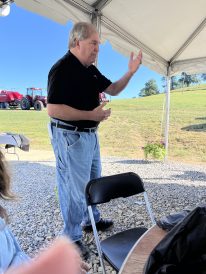Deer damage dominates conversation at Washington County’s annual farm tour
 Rick Shrum/For the Observer-Reporter
Rick Shrum/For the Observer-Reporter
Dave and Renee Dickson oversee operations at Foster Farm Acres in Buffalo Township. “Renee owns the place and I’m the caretaker,” Dave said, referring to his spouse, whose family has been in charge for three generations.
“We raise beef, hay, oats, corn . . . whatever the deer don’t get. Everyone in the family helps. We’ve had five generations here.”
The Dicksons were congenial hosts last week of the annual Legislative Farm Tour organized by two Washington County agencies: its Farm Bureau and Conservation District.
Crop damage wrought by deer and other wildlife kicked off and dominated more than an hour of angsty conversations among an estimated invited 80 guests, including two state representatives, a state senator, two county commissioners, two Game Commission officials and a staffer for U.S. Sen. John Fetterman.
Oh, and there were farmers, a number of whom are disgruntled over the havoc deer and other creatures are wreaking on their properties and businesses.
On a coolish Wednesday morning, Dickson abandoned his congeniality for a few moments to raise a different type of beef on the family’s 400-acre farm. About a half-hour into the tour, he stood and lamented that deer damage is costing him “$750 an acre for seed, spray and fertilizer. I have to plant 40% more to stay even.”
He was among a collection of farmers from across the county to speak not so dearly about deer.
“This problem came from out of nowhere,” said Jim Lindley, who grows crops on his Scenery Hill farm. “I had planted beans and was devastated when I realized they had been eaten. You could see 30 to 40 deer on the horizon afterward.”
County Commissioner Larry Maggi attended the tour and dryly acknowledged the deer conundrum. “I had lived around here for a long time and driven thousands of miles and had never hit a deer. In the last five years, I’ve hit five of them.”
Lindley added that “everyone” who is farming in the region has crop insurance, “and it is being devalued. If they see it is deer damage, they’ll shut off crop insurance. It’s really bad for a lot of guys.”
Lisa Wherry, president of the Washington County Farm Bureau, told the Observer-Reporter a year ago that Lindley in 2023 “said he lost $20,000 because of crop damage from wildlife.”
Wherry, a family sheep farmer in the Scenery Hill neighborhood of North Bethlehem Township, said then that “it’s mainly been deer. They’re wiping us out. Deer also are annihilating our hay, which is a crop, too. Coyotes are creating another problem.”
The Pennsylvania Game Commission oversees an initiative set up to benefit landowners affected by crop damage and hunters alike. It’s the Certified Hunter Program, which enables hunters certified by the Game Commission to harvest deer on properties of landowners who will allow it.
Among the requirements, these hunters, according to the Game Commission, must be at least 18, have passed Hunter-Trapper Education and purchased a hunting license four of the past five years. Hunters, ostensibly, can fine-tune skills and get more tags to hunt.
Landowners, in turn, have to provide land access to certified hunters and complete a land usage guide for the property.
Hunters, Wherry said, “typically get one tag for five cultivated acres.” For more information, visit the Game Commission website: https;//www.pa.gov/agencies/pgc/.
One issue among farmers dealing with damage from animals, however, is the Certified Hunter Program excludes harvesting of antlerless deer.
“You can’t limit this to antlerless deer,” Dickson said. “Bucks, fawns and doe all eat. “Eight-point bucks are a dime a dozen.”
The deer problem, he added, “is a statewide problem. We need help right now.”
In an attempt to alert Gaming Commission officials of the county’s concerns, Wherry has agreed to comment at the board’s next meeting on Sept. 5.
Broadband issues were another topic addressed, amid confusion and uncertainties about why service sometimes is insufficient or lacking. County Commissioner Nick Sherman said the county “led the state in broadband initiatives. We were told Washington County would get the lion’s share of money. Will it happen? I don’t know.”

